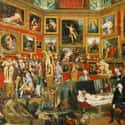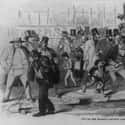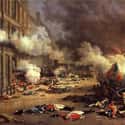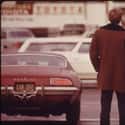-
(#1) The Credit Crisis Of 1772 Was Caused Because Some Deadbeat Didn’t Want To Pay Back His Debts
In the 18th century, economic expansion was heavily reliant on investors’ and entrepreneurs’ ability to get credit for their projects. The stability of that credit was, in turn, heavily reliant on people's faith in banks. Cut to a Scottish banker jerk named Alexander Fordyce, who incurred a whole lot of debt and then decided not to repay it.
That became big news in London, because Fordyce was a partner in a huge banking firm in the city. When Fordyce ducked out to avoid his debtors, people lost their faith in the banks who were supposed to be, you know, reliable. The result saw a slow freeze of the European economy that seriously hindered the public’s faith in debt and credit.
Too bad it didn’t stick.
-
(#2) An Economic Boom Turned Disastrous In The 1920s, Leading To The Great Depression
The 1920s saw the American economy swell to heights never before imagined. And that's how the decade is remembered - as one of beaded, alcohol-flowing, flapper-dancing decadence. Unfortunately, that exuberance led to the overvaluing of stocks on Wall Street. When the truth came out, the American economy was decimated. By 1931, more than six million Americans were out of work.
The economic collapse that landed many working Americans in bread lines didn’t end for a full decade, until the Nazi war machine made American manufacturing a vibrant, thrumming part of the war effort.
-
(#3) Small Banks Hurt Themselves To Cause The Panic Of 1837
When Andrew Jackson was president in the early 1830s, he operated under the impression that a National Bank was a horrible idea. As a result, he siphoned a whole bunch of funds from the Second Bank of America (AKA, National Bank 2.0) and gave that money to America’s small banks. Sweet, right?
It would have been if the country’s small banks hadn’t sunk all that money into overvalued speculations on exciting new lands in the West. Too bad most of it turned out to be normal farmland or - worse - huge expanses of basically useless rock or sand (it sure is pretty, though).
In 1837, during the early presidency of Martin van Buren, the sh*t really hit the fan. The President refused to change his predecessor's policies or stabilize the ailing economy, a decision that crippled the US economy well into the 1840s (and lost van Buren his re-election bid in 1840).
-
(#4) Tulip Mania Almost Destroyed Holland... No, Really
In 1593, some enterprising flower peddler from Turkey introduced tulips to Holland, and the Dutch went absolutely crazy for the little flowers almost immediately. Unfortunately, the flow of tulips into the country was slow, which drove the price of the flower higher and higher.
Then, the Dutch tulips got the coolest disease ever: something known as mosaic, a non-threatening disease that turned the petals vibrant colors. This alteration only drove the price of tulips higher. It wasn’t long until people were doing everything they could - even cashing in their life savings and liquidating land - to get their hands on some tulip bulbs. As it turns out, tulip bulbs aren’t actually worth all that much, and most of the investments in tulips turned out to be (surprise!) basically worthless. The resulting depression made the Dutch resistant to the entire speculative investment game for decades to come.
-
(#5) Donating Money To The American Revolution Threw France Into A Revolution Of Its Own
Properly begun in 1789, the French Revolution was a direct result of the economic collapse of the French Crown following the American Revolution. Thanks to the lavish spending of Louis XVI in support of the American army during the war (as well as on his own ridiculously opulent lifestyle), French citizens found themselves with little to no food or income and without support from the Crown itself.
The inability of the King to support his people financially gave rise to the Jacobin movement, which ultimately brought down the French Crown and thrust the country into more than a decade of blood-laced anarchy.
-
(#6) Though He Left Office With Record Approval, Reagan’s Early Years Were Tough On The Economy
From 1981 to 1982, the United States suffered through its worst economic depression since the big one of the 1930s. In spite of the country’s initial optimism that the new president, Ronald Reagan, would improve the economic situation, exactly the opposite proved to be true. Within 18 months of Reagan’s presidency, the country’s unemployment rate had risen to more than 10%.
In September of 1982, 54% of Americans said that Reagan’s economic policies had made their situation worse. Miraculously, though, the public’s opinion remained hopeful throughout the downturn and into the following years.
-
(#7) The Economic Crisis Of The 14th Century Was Caused By A Royal Thirst For War
From about 1300 until 1450, the Church suffered from a decline in power in Europe and England. Thanks to increasingly warlike kings in France and England, the Church became a target for taxation and outright plunder. Even more, the kings of Europe levied incredibly high taxes on the people of their countries in an attempt to fund their need for constant warfare.
Though most of the skirmishes were tiny, the result was the centralization and then dissipation of most of Europe’s funds just so the richest people on the Continent could wage meaningless non-wars against one another. One of the major repercussions of this depletion of funds was the rise of sub-human living conditions that helped brew up the Black Death.
-
(#8) The Oil Crisis Of 1973 Wrecked More Than Just A Trip To The Gas Pumps
In 1973, the United States decided to pitch in and help out Israel during a war they were fighting against... well, basically everyone else in the Middle East. When the Arabs on the other side of the Arab-Israeli War got wind of US interference, things got nasty. Most of those countries were part of the Organization of Petroleum Exporting Countries, or, as they’re known on the street, OPEC.
In response to US aid, OPEC imposed an embargo on United States oil imports, which pretty much halted the US economy (and ruined the traffic flow around gas pumps nationwide). Without the United States pitching in and buying stuff, the rest of the world soon felt the ill effects of OPEC’s embargoes.
-
(#9) The Mississippi Bubble Slowed Down Trade With The New World For Almost A Century
Along with another similarly timed “bubble” known as the South Sea Bubble, the Mississippi Bubble essentially crippled an entire nation’s economy. In 1720, an investor named John Law obtained the right to cultivate some of France’s land in the New World. Law proceeded to tout the incredible potential for wealth in the area, which caught the interest of investors.
In spite of the fact that most of Law’s statements were utter bullsh*t, he had total government backing since no one could actually disprove any of his statements. As a result of the interest in his company, shares rose by something like 3600%. Then, like true geniuses, the French government started printing money so people could invest more capital in Law’s scheme. And everything went great until the extra paper money started triggering crazy inflation, and Law was forced to flee the country.
-
(#10) The Spanish Royal Family Proved That Financial Management And Inbreeding Do Not Mix
Though the Spanish treasury was riding high around 1600, with an estimated $3 trillion in plundered goods, by 1627, the whole thing had come crashing down. While the incredible lack of branches in the Spanish royal family’s tree (it looks that way because brothers married sisters) didn’t directly contribute to their financial ruin, it certainly helped.
What really did the job was the fact that Spain spent the late 1500s conquering a part of the planet that: a) didn’t want to be conquered, and b) outnumbered the Spanish soldiers by a lot. As a result of gaining their fortune through force, the Spanish government was forced to spend the money just as quickly to maintain control of their land. It didn’t work, and, as a result, Spain was forced to spend most of the 17th century groping in the dark and caring for mentally deficient monarchs.
-
(#11) Rome Fell Because There Wasn’t Enough Coin To Go Around
By the 2nd century CE, a series of increasingly crappy Roman rulers had taken its toll on the financial foundations that had secured the Empire’s run for more than 800 years. When the centralized government of Rome became overrun with infighting and one assassination after another, the degradation of Rome began properly in 235 CE, following the murder of Emperor Alexander Severus.
The unprecedented financial machine created by Rome was left without a point of regulation, which caused the minutia of the great machine to break down bit by bit. As the job of “Roman Emperor” became slowly reduced to whoever was holding the knife, the economic stability of the Empire was completely destroyed.
-
(#12) The Long Depression Proves That Doing Things On Credit Is Never A Good Idea
In the early 1870s, things were good in America and the whole world over. While the country was still rebuilding from the Civil War, the economy was thriving, and an optimistic mood was infectious. Then, a fellow named Jay Cooke recommended financing railroad expansion on credit. After all, what could possibly be a safer bet than railroads?
When the scheme ultimately backfired, Cooke’s financial house was run out of business and caused a “run on banks,” which basically means a lot of customers withdrew their funds from the banks in a rapid fashion. Though the Treasury managed to ensure that everybody got their money, the damage was done, and consumer confidence was totally shot. The resulting decline in consumerism led to an economic slowdown that rippled across the world and lasted - depending on your metrics - until 1896.
-
(#13) Oh Yeah, The Housing Bubble Burst Of '08 Is One Of The Worst Economic Collapses In History
Thanks to a whole bunch of shady dealing in the early 2000s having to do with America’s bond market and people who couldn’t afford their houses (it’s complicated; watch The Big Short), December of 2007 saw the bursting of a housing bubble worth an estimated $8 trillion. The loss of wealth trickled down to the average buyer soon enough as consumer spending began to drop. When people stop buying, the economy stops pumping, which happened from 2007 until 2009.
The resulting recession saw the loss of 8.4 million jobs, the largest number since the Great Depression. Nicknamed the Great Recession (because economists are not creative), the housing crisis lowered the net income of American households for the decade to come.
-
(#14) The Latin American Debt Crisis Nearly Killed Citibank
In the early 1970s, the price of oil began to rise exponentially, skyrocketing more than 1200% over the course of the decade. When the price of other goods and services didn’t rise to meet the demand for oil, several countries in South America found themselves unable to meet their fuel bill at the end of the year. Fortunately for them, Walter Wriston, then-CEO of Citibank believed that countries can’t go bankrupt, so he started issuing big-time loans to these countries.
For a while, things were fine because the banks could reap huge profits from the existing loans (thanks to financial trickery) without the countries actually having to pay them back. The banks even managed to turn a profit off the perceived value of the loans, not the actual payments themselves. Then, one day, Citibank called in one of its loans to Mexico. Mexico, in turn, essentially threw up its arms and said tough luck. That was just the beginning of an economic recession that worked its way across the globe over the course of the next several years.
New Random Displays Display All By Ranking
About This Tool
The stock market crash is one of the main signs of the world financial crisis. According to the recorded period of economic collapse in history, nine financial crises with huge scope and far-reaching impact have occurred on a global scale. Some major economic recessions will directly cause huge chaos in society and the economy and have a profound impact on future generations.
Economic collapse is often accompanied by a large number of business closures, a substantial increase in unemployment, and even severe social or political turmoil. The random tool introduced 14 important historical times about the economy that was on the verge of collapse.
Our data comes from Ranker, If you want to participate in the ranking of items displayed on this page, please click here.
























